Welcome to the week. Here are the most notable stories our writers and readers have come across in the past seven days…
This week’s Roundup is brought to you by the Ride the Dirt Wave – Klootchy Creek event coming June 3-4th. Grab your best buds and head out to the Oregon Coast (off Highway 26, before Cannon Beach/101 turnoff) to discover the amazing singletrack and flow trails at Klootchy Creek. Two days of riding and creature comforts await! More info and registration here.
And now, let the Roundup begin…
This week’s must-read: When author Adam Gopnik takes up the cause of explaining America’s addiction to cars and what it will take to wean us from it, you better believe it’s worth your time to read it. (New Yorker)
Portland, please steal these ideas!: We have all the pieces in place to seriously tame cars and their drivers and finally reclaim our city. We should use Brussels as a blueprint. (Bloomberg)
Oh no you don’t: Seattle and other cities are suing two automakers for a design flaw they say is leading to public harm — could this be a crack in the door toward stronger regulation of car designs in general? (The Urbanist)
Very relatable drama in Berkeley: Staffing shortages leading to project delays, controversy around a failed protected bike lane project in a well-off neighborhood — the mess at Berkeley DOT reminds me of what has happened in Portland and could happen more as our budget implodes. (Berkeleyside)
Biden’s climate problem: The Biden Infrastructure Law is fueling freeway expansion and new highway projects nationwide — and that should be a problem for a politician who says he cares about climate change. (E & E News)
Make traffic count(s): I’m posting this for all our readers who work at local planning agencies and engineering firms because we desperately need a breakthrough in counting non-car traffic. (Tech Crunch)
It’s the commute: If our leaders want more people to go back into the office, they should start by making the commute as pleasurable as possible. (NY Times Opinion)
Bike theft battle: The Denver Police Department knows that the best way to return stolen bikes is to get them registered so they’ve partnered with a third-party to make it happen. (Denverite)
E-cars dirty secret: Electric cars might now spew toxic exhaust from their tailpipes but they slough off toxic chemicals from their tires. (Reuters)
Automate it: Safe street advocates in Los Angeles are using Portland as an example and pushing elected officials to adopt a bill that would open the door to more automated traffic enforcement cameras. (Streetsblog LA)
Bicycle marching band: Seriously. And of course it’s Dutch.
Thanks to everyone who shared links this week!



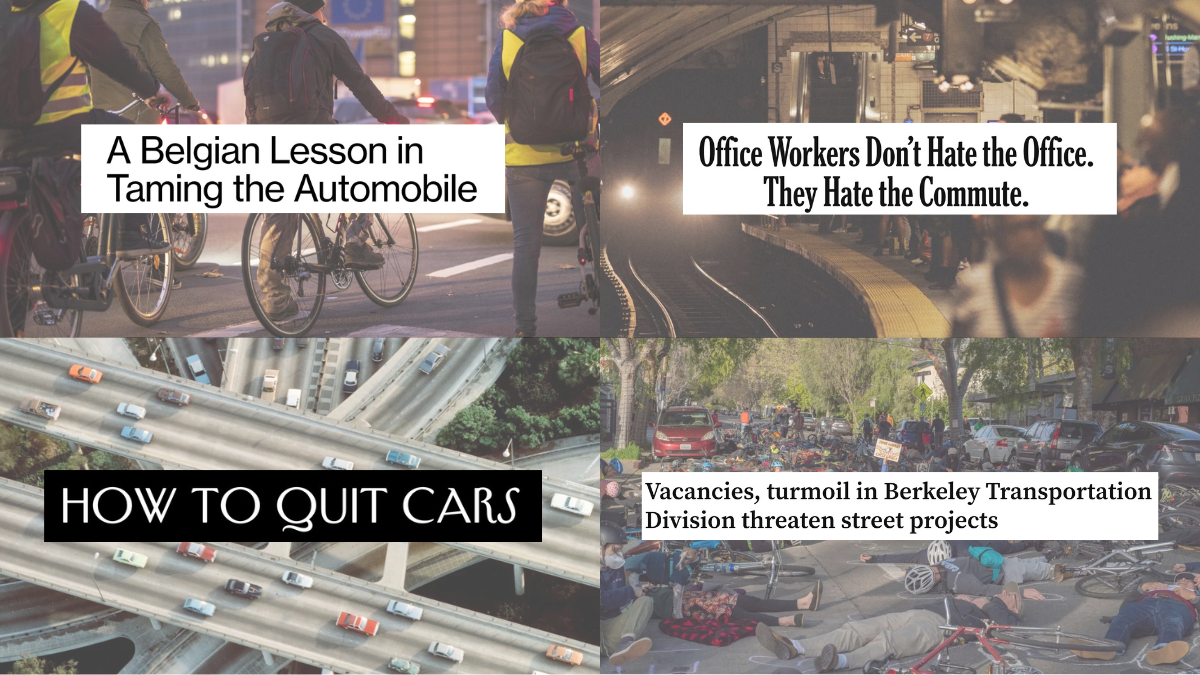
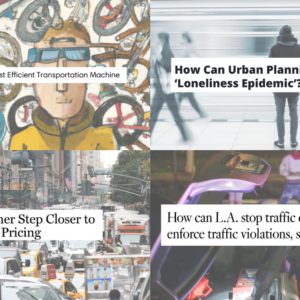
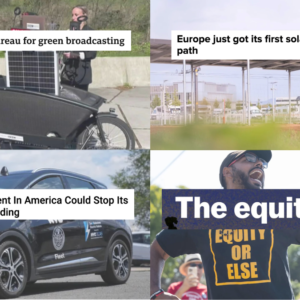
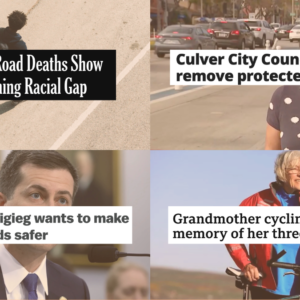
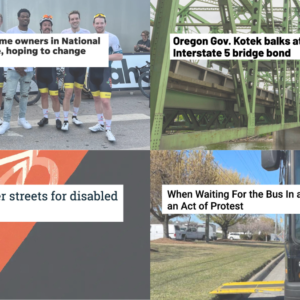
Thanks for reading.
BikePortland has served this community with independent community journalism since 2005. We rely on subscriptions from readers like you to survive. Your financial support is vital in keeping this valuable resource alive and well.
Please subscribe today to strengthen and expand our work.
“Portland, please
steal these ideasdevelop a sense of basic human decency!”The transformation of Brussels was not due to implementation of the tiny, tiny policy reforms (e.g. dynamic parking pricing) that urbanists/centrists believe are the solution to all of society’s ills. A green-left political revolution triggered transformation of Brussels’ transportation system. Portland, please develop a sense of basic human empathy and decency and stop clinging to the failed neo-liberalism of centrism/”market urbanism”. (I’m not holding my breath.)
Some good advice from the article:
To which I would add, stop railing about “failed neo-liberalism” (or late-stage capitalism). Nothing turns folks off quicker than that.
Apparently not in much of Belgium (the point of my comment). A secondary point, is that there is a near perfect correlation between regions that have made active transportation a priority and green-left political sweeps.
From the Belgian “Groen” platform:
The world isn’t fair. Do you sometimes have that feeling? The gap between rich and poor is widening and those least responsible for the climate crisis bear the brunt of it.
With Green, we are eliminating inequality in Belgium step by step . We provide a decent income for everyone. A warm home with an affordable energy bill. Good education for every child. Free meals at school, so no one goes to class hungry.
We are eliminating the acute shortage of social housing by adding new buildings and renovating outdated buildings…To eliminate the long waiting lists, the number of social housing units must double in the next 10 years. Housing is a fundamental right and providing it is a task of the government. That is why public housing and land should remain in public hands as much as possible – because the private sector does not have that task.
Due to the high tax on labor, people who work and do business have too little money left over. That is why we are reducing the burden on labor by making employer and employee contributions progressive: the lower your wages, the less you have to contribute in percentage terms
Our capital gains tax replaces all current wealth taxes. T.. Above that exempt bracket, you pay a progressive rate on your net assets (assets minus debts). The richer you are, the more you contribute.
The richer you are, the more you contribute.
_ _ _ _ _ _ _ _ _ _ _ _ _ _ _ _ _ _ _ _ _ _ _ _ _ _ _ _ _ _
In Oregon, the richer you are, the less you contribute (this should be the motto of this state):
Blaming car companies for an out of control crime problem is pretty lame. Well done Seattle.
Next they’ll want auto makers to be sued if terrorists or drunks or lunatics or others intentionally use vehicles as weapons, followed by unintentional strikes. Don’t forget the 10,000 per cent tax on motor vehicle fuels (and EV charging) alternative.
From the New Yorker article, describing the push for more urban “expressways” and other modern ideas to replace the old electric trolleys:
I see a similar urge to destroy the old and replace it with the new in today’s progressive planners who want to demolish much of our existing housing stock and replace it with “modern” mid-rise apartment buildings (and have been successful along some of the main streets in N/NE Portland, which has contributed to the gentrification and displacement in those areas, e.g. N Vancouver).
The road to hell, they say, is paved with good intentions.
There are known ways to reduce displacement and being priced out of neighborhoods. Not building housing is not one of those methods.
Building market rate housing is also not one of those methods (at least over a time-scale that shows any modicum of concern for the chronic low-income housing affordability crisis).
If you rely solely on the private sector, sure. That’s why I remain befuddled that I rarely ever even hear the words “Faircloth amendment” in discussions of the housing crisis. To whatever extent we live in a market economy, the stubborn resistance to the modest housing growth we’ve seen is a very clear signal that we’re not doing even a fraction as much building as we need to; why not get the public sector involved? “The government is incompetent”; well, that sounds like a problem that we should work on, doesn’t it?
Private developers have an obvious disincentive to build enough to reduce housing prices; why would they want to risk cutting their own profits? All the same, have you seen the scale of housing production in a place like South Korea or China? How can you say we’ve even attempted to address a supply shortage when seeing private (and public) housing construction on any scale anywhere in the U.S.–including NYC, whose housing construction rates pale in comparison to its global peers like Seoul, Tokyo, or Paris–is fought against so thoroughly that it’s practically a source of pride for so many people?
The current alternative to demonizing market-rate housing has appeared to be from you “left” NIMBYs to not build any housing at all. What a wonderful way to solve the housing crisis.
1) The Faircloth amendment is something I write/talk about a lot.
.
2) I support legalizing high-density rental housing everywhere. We can’t build social housing* without re-legalizing rental housing. It’s the ultra-low density “owned” housing that both NIMBYs and YIMBYs tend to support (e.g. single unit homes, small plex condos) that I believe should be restricted in urban areas — or at the very least the urban center.
*The goal of social housing is to house people who are housing insecure people and to make the housing attractive and decent enough that they stay after their incomes increase. It should not be designed to house wealthy people from the start (e.g. YIMBY fake “social housing”).
I think you have a very slanted view of the YIMBY position. I’ve yet to meet a single one that only wants to build housing for wealthy people, much less low-density housing of any kind. This seems completely antithetical to the YIMBY position. I also don’t hear of YIMBYs pushing for bottom-of-the-barrel quality rental housing stock.
The rental housing market is almost entirely class A housing (e.g. luxury housing):
https://www.rentcafe.com/blog/apartmentliving/luxury-apartments/8-out-of-10-new-apartment-buildings-were-high-end-in-2017-trend-carries-on-into-2018/
I don’t support upzoning because I want to see more class A housing but rather as a necessary step in creating the only housing type that will directly address the housing crisis: deeply-subsidized rental housing and, preferably, social/public housing.
Give me a break. YIMBYs in Portland and other cities have been laser focused on “legalizing” slightly smaller homes, ADUs, and low-density plexes. And to make matters worse, they have also strongly advocated for lot subdivision/condoization deregulation that makes it more likely that any new low-density housing will be targeted to people who can afford to own (e.g. not renters).
When YIMBYs start focusing on legalization of large rental apartment buildings in residential zoned neighborhoods (and not just along traffic sewers), I will be less critical.
PS: Some left-YIMBYs have improved their positions vis-a-vis tenant rights but many tenants-right-advocates support housing decommodification and are not going to be especially friendly to people in coalition with liberterians and republicans.
I’d argue that people focusing on doing this kind of thing either don’t understand the scale of housing production we need, or refuse to acknowledge it ergo they aren’t YIMBYs, but rather NIMBYs who don’t like it when you call them that. Not Just Bikes mentioned this problem in a podcast with Strong Towns a while ago: when you don’t make medium-to-high density the norm or at least a possible norm everywhere in a city, all you’re really doing is jacking up land values by shorting supply to the point that when anything does end up being built, it’s very expensive, very tall towers that end up becoming even more expensive because they are “out of character” with the much lower-density surrounding neighborhoods.
I’d say don’t even give these people the benefit of calling them what they want to be called. These are NIMBYs in disguise, not people who are actually interested in doing anything to accommodate the kind of housing growth a quickly-growing region like Metro Portland needs. “Incremental development” doesn’t work when we’re this far behind. (The same certainly applies to NYC and my home region of Greater Boston.)
The thing is that an awful lot of YIMBYs have focused on lower-density housing (because it’s easier and does not upset the status quo much) so your claim that these are not “true” YIMBYs smells like the no-true-scotsman fallacy. Is PfE/P:NW not a YIMBY-affiliated org? Is Sightline not allied with YIMBYism?
I’ve been making this “left-NIMBY” argument for years so it’s nice that some YIMBYs are concerned about the distributional effects of these low-density “missing-middle” housing types. However, my ultimate goal is housing de-commodification so I will always have differences with and skepticism of those who believe that the market should play a primary, or even, major role in addressing the housing crisis. From my perspective, the market has failed and should be gradually replaced with a system that ensures housing as a right, not as a luxury (to be hoarded).
It’s not a crisis, as with so many other misuses of that word, but is a shortage, particularly of <b>affordable</b> housing, which like the formal set of income categories goes well up the income ladder in the more expensive metro areas. It’s not just about the poor, though many feel as you do and as one person said in plain, real-world language, “‘Affordable’ means the poor can live in it.”
Demand isn’t limited to individuals and households; it includes big money since the last several years, in particular, as well as foreign as well as domestic interests. This is for major metros outside as well as in the USA.
What about the supply of land to build on, particularly when so many want houses now or later, and if that land that is rezoned for more density in a higher-demand area, is it worth more or less than before, cheaper or more costly? For real affordability, the core of shortages in many cities, there will have to be public sector intervention, plus with multi-unit housing you have the usual crowding (and overcrowding) concerns and worse when it is reserved for the lower income groups And no, we are not Vienna II.
Gentrification in N/NE Portland was primarily caused by mostly-white well off folk purchasing single-unit households. The development of luxury apartments is a sign of a neighborhood that has finished gentrifying*.
*Please note that I am firecely pro-upzoning for high-density apartment buildings everywhere. It’s zoning for the very low density housing types supported by NIMBYs and YIMBYs that I oppose.
Where did you get the gentrification graphic from? I notice in the marginal stage there is no mention of blue collar workers. Did the graphic creator not find any blue collar workers, is that an oversight or a bias? As presented it seems like a financial battle between people who have already inherited their fortune and those who will in the future and as such i have little sympathy for them.
I agree some of the language in that graphic is off.
The original typology from Dr. Lisa Bates:

Description:
https://pdxscholar.library.pdx.edu/cgi/viewcontent.cgi?article=1082&context=usp_fac
Thank you for the link. I havent perused all 96 pages yet, but looks very solid and nowhere near as frivolous as the graphic.
YIMBYs want hamster housing, mass housing. They aren’t all gleeful bright-eyed affluent kids, some with development interests, or family or other ties.
They routinely share something so many activists of all kinds what: they want this, that, or the other for <u>other people</u>, as if arranged or provided for them to view with pleasure; if they’re heady, for Approval.
Cheers.
Wanting to house everyone living in Portland?
Quelle horreur !!!!
PS: Yes, I’m defending YIMBYs who want hamster housing [sic] so keep on “left-NIMBYing” me PfE/P:NW peeps.
At what stage do the Corgis show up?
Cheap, bland to hideous, wood-frame mid-rise housing has revolutionized housing development, for developers and pliant politicians, plus YIMBY and other activist dupes and fellow travelers. That’s with or without sitting atop a level or two of concrete with open retail spaces to house the “unhoused” and other non-standard occupants, if only briefly. There even are high-rises looking like that, or trendy and sadly dated. For more fun, they’re built without enough or sometimes, any parking, leaving that to the surrounding streets, whether that’s said or admitted, or not.
Such is change we have seen since housing development has been changed.
Portland has approved a 3-phase plan to replace the huge and reasonably priced Douglas Apartments with luxury housing. The first phase seems great- it replaces the Riverplace athletic club with a 30-32 floor tower and a second building that I haven’t seen a description for, yet. Phases 2 and 3, however, displace hundreds ofr thousands of tenants to replace nice, affordable studio-3 bedroom apartment and townhouses with new version that will cost considerably more. This seems like a giant step backwards on our slog toward sustainability and affordable housing.
These apartments are people’s homes, not units of profit. It should be exceedingly difficult to displace people already living in multi-unit apartment buildings to build more expensive multi-unit buildings. A tenants right to remain/return is badly needed but I doubt there will be much interest in this “Homeowners Gone Wild” city until the housing crisis worsens.
Don’t expect high-rise housing to be cheap.
Don’t expect any housing to be cheap without government involvement.
Equating *very* modest recent increases in housing density with mid-century urban highways that demolished entire neighborhoods is perhaps the apotheosis of the kind of reflexive contrarianism I’ve come to expect from this comment section. Well done.
The Seattle suit against Korean car companies for being targeted for theft is insane. The article even presents a situation in which it would be a good idea to sue and I think it’s a great idea. Cities should sue over the ridiculous modern SUV/Truck designs as they are most often on the hook in the costs of their police/fire/paramedics who are constantly having to respond to needless death and injury.
“Whether the intention of the City or not, the case highlights the need for greater regulation of the auto industry….For example, automakers, finding that SUV’s support bigger price tags, have been building bigger cars. Bigger cars result in deadlier collisions with pedestrians. Yet, the failure to take commonsensical steps, like limiting hood heights, banning bull bars, or requiring speed governors or immobilizers hints at regulatory capture and the need to reel-in the industry lest traffic fatalities continue to climb past 40,000 per year.”
But Seattle is suing over theft?!?
“Instead of attacking the many heads of the Hydra by merely prosecuting the thieves, the cities are taking aim at the monster’s heart, accusing the automakers of causing harm via faulty design.”
Why not just admit you don’t have the ability or desire to arrest criminals instead of trying to pass the buck?
Lawsuits over increasingly bloated vehicles, many that are taller and feature squared or blunt front ends that are even more hazardous to “vulnerable road users,” constitute more bogus behavior that should result in malicious prosecution penalties like other activist junk lawsuit behavior by governments.
What can be done is to examine practice elsewhere and to the extent the authority is legitimate, have NHTSA intervene as it has with other things like EV low-speed warning tones on behalf of the blind and poorly sighted. As with something else that I await with a very positive feeling in the USA, ISA, Europe is a place to watch as some things already are being tried as well as studied, so we can let them do the pioneering and learn what not to do as well as what to do before we act here.
As cyclists, we have everything to gain for any (<i>intelligently and properly pursued</i>) motor vehicle design hazard reductions, of hazards to cyclists as well as to pedestrians, just as with speeding being inhibited substantially in the future. (Also of interest are advances in pedestrian-bike detection and related auto-stop.)
I’m not sure that mandating a decrease in size and lethality of incredibly oversized vehicles are the same as mandating a warning tone on an EV. As far as the NHTSA is concerned, their boss, the current president loves EV Hummers and EV Ford trucks so i strongly doubt that there will be any top down push to mandate a smaller or safer size. Also, it is doubtful that that is even possible given modern technology as EVs seem to consistently outweigh ICEs.
https://www.cnn.com/2021/06/07/business/electric-vehicles-weight/index.html
So instead of waiting for some kind of Federal savior to maybe or maybe not appear I really think cities should take the lead and force manufacturers to build cars that aren’t so deadly to everyone else around them by hitting them in the pocket book.
EVs are quiet and deadly to the blind and poorly-sighted, if not to us.
It’s not the place of cities, nor the high ground to be activist about it.
Sure, DC is starting to play that silly game, but it’s not legitimate nor respected by the respectable. On the other hand, charging for parking along a curb by length or in a lot by area is certainly worth a whirl.
Charging by weight may have its applicability, and I suggest the right thing for this, published Gross Vehicle Weight Rating, or GWVR, the max weight the vehicle is permitted to attain. That and an odometer reading is sufficient for a form of use charge periodically, such as on an annual basis. Of course, it’s far from perfect but fuel use or EV charging is a good surrogate that has worked or is working already, at least to a partial extent. (A big boost to taxing those should wait until the pension costs really mushroom in another decade, at least, but will those who could do this be patient and look past their noses?)
Following this logic, the next time I have another bike stolen, should I expect a bill from the city for the harm I caused by not using a beefy enough lock? What a joke. I’m surprised Portland hasn’t signed on.
They’re suing the manufacturers, not the owners, for making a vehicle that is comically easy to steal.
My point is that there is no logical difference. It stems for the same dodge to remove accountability from both criminals and the officials elected to manage our cities and enforce our laws. I may choose to keep my house and bike unlocked and my car in the driveway with the keys in the ignition, but that doesn’t change the fact that stealing from me, though comically easy, is still a crime committed by individuals making their choice. I’m so tired of the excuses and search for scapegoats epitomized by this lawsuit.
I’m glad you looked at the Berkeleyside article. In comments there I pointed readers to you. Also look at the image of that ridiculous “die-in” in support of a poor-quality cycle track where it didn’t belong. Those are today’s cycling activists or “advocates.” The raised sign smacks of Dr. Seuss’s works. These are children.